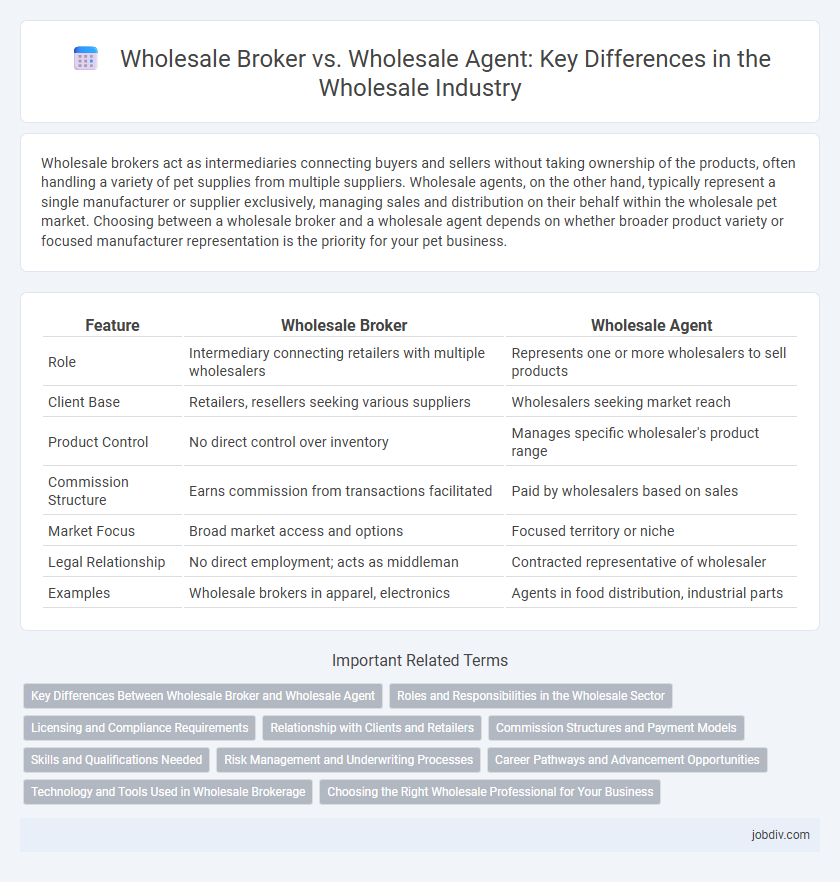Wholesale brokers act as intermediaries connecting buyers and sellers without taking ownership of the products, often handling a variety of pet supplies from multiple suppliers. Wholesale agents, on the other hand, typically represent a single manufacturer or supplier exclusively, managing sales and distribution on their behalf within the wholesale pet market. Choosing between a wholesale broker and a wholesale agent depends on whether broader product variety or focused manufacturer representation is the priority for your pet business.
Table of Comparison
| Feature | Wholesale Broker | Wholesale Agent |
|---|---|---|
| Role | Intermediary connecting retailers with multiple wholesalers | Represents one or more wholesalers to sell products |
| Client Base | Retailers, resellers seeking various suppliers | Wholesalers seeking market reach |
| Product Control | No direct control over inventory | Manages specific wholesaler's product range |
| Commission Structure | Earns commission from transactions facilitated | Paid by wholesalers based on sales |
| Market Focus | Broad market access and options | Focused territory or niche |
| Legal Relationship | No direct employment; acts as middleman | Contracted representative of wholesaler |
| Examples | Wholesale brokers in apparel, electronics | Agents in food distribution, industrial parts |
Key Differences Between Wholesale Broker and Wholesale Agent
Wholesale brokers facilitate transactions by connecting buyers and sellers without taking ownership of the goods, earning commissions based on completed deals. Wholesale agents represent manufacturers or suppliers, acting as intermediaries to promote and sell products exclusively, often with a contractual agreement. The primary distinction lies in brokers' independence and transactional role versus agents' representational duties and ongoing relationships with principals.
Roles and Responsibilities in the Wholesale Sector
Wholesale brokers act as intermediaries who connect manufacturers with retailers by facilitating negotiations and transactions without taking ownership of the products. Wholesale agents represent manufacturers, managing sales efforts and customer relationships to maximize distribution but typically do not purchase goods outright. Both roles require deep market knowledge, strong negotiation skills, and a focus on streamlining supply chain operations to enhance efficiency in the wholesale sector.
Licensing and Compliance Requirements
Wholesale brokers must obtain a broker license, demonstrating compliance with state regulations and fulfilling bonding and continuing education requirements. Wholesale agents operate under the supervision of licensed brokers, allowing them to bypass individual broker licensing while adhering to agent-specific compliance standards. Both roles require strict adherence to state insurance department rules, but brokers bear greater responsibility for regulatory compliance and managing client contracts.
Relationship with Clients and Retailers
Wholesale brokers act as intermediaries connecting retailers with multiple wholesalers, maintaining flexible relationships without exclusive binding, which allows them to offer a broader range of products. Wholesale agents build stronger, more exclusive relationships with specific wholesalers and retailers, often managing long-term contracts and fostering loyalty through personalized service. The choice between broker and agent impacts the depth of client and retailer relationships, influencing trust, negotiation dynamics, and product availability.
Commission Structures and Payment Models
Wholesale brokers typically earn commissions as a percentage of the total transaction value, often negotiated between the client and multiple suppliers, ensuring they receive payment only upon successful deals. Wholesale agents usually operate on a fixed commission basis set by the principal supplier, receiving consistent payments tied directly to sales volume or contract terms. Understanding the differences in commission structures helps businesses choose the right intermediary for cost efficiency and sales strategy alignment.
Skills and Qualifications Needed
Wholesale brokers require strong negotiation skills, market knowledge, and the ability to build and maintain client relationships. Wholesale agents need expertise in product knowledge, sales techniques, and customer service to effectively represent manufacturers or wholesalers. Both roles demand excellent communication and analytical abilities to navigate complex transactions and ensure client satisfaction.
Risk Management and Underwriting Processes
Wholesale brokers act as intermediaries between retail agents and wholesale insurers, focusing on risk management by evaluating client profiles to ensure appropriate underwriting standards are met. Wholesale agents represent specific insurance carriers, directly managing underwriting processes and assessing risks in line with the insurer's guidelines. Effective collaboration between wholesale brokers and agents streamlines risk evaluation and improves accuracy in policy issuance.
Career Pathways and Advancement Opportunities
Wholesale brokers typically operate with greater independence, owning their client relationships and earning commissions directly, which fosters entrepreneurial skills and offers potential for business growth and higher income. Wholesale agents usually work under a wholesale broker or agency, gaining hands-on experience and industry knowledge that can lead to roles in senior sales, management, or transitioning to independent brokerage. Career advancement for wholesale brokers often involves expanding their client base and market reach, while wholesale agents build foundational expertise and networking opportunities essential for long-term success in the wholesale industry.
Technology and Tools Used in Wholesale Brokerage
Wholesale brokers leverage advanced digital platforms and customer relationship management (CRM) systems to streamline policy placement and data analysis, enhancing efficiency and client communication. Wholesale agents primarily utilize industry-specific quoting tools and electronic binding systems to facilitate quick access to multiple carriers and instant policy issuance. Both roles increasingly depend on integrated technologies to optimize workflow, reduce manual processes, and improve overall service delivery in wholesale insurance markets.
Choosing the Right Wholesale Professional for Your Business
Selecting the right wholesale professional hinges on understanding the distinct roles of a wholesale broker and a wholesale agent. Wholesale brokers act as intermediaries connecting buyers and sellers across various industries, often representing multiple clients without holding inventory. Wholesale agents typically work on behalf of manufacturers or suppliers, committed to selling specific product lines and maintaining direct relationships with buyers to ensure consistent market presence.
Wholesale Broker vs Wholesale Agent Infographic

 jobdiv.com
jobdiv.com